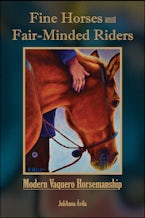What we currently call “horse whispering” has roots in a form of western horsemanship that traveled from Europe to Mexico and the United States, and was then transformed by Native Americans and working cowboys into Vaquero horsemanship. Fine Horses and Fair-Minded Riders: Modern Vaquero Horsemanship documents the learning and practice of Vaquero horsemanship, which has survived as a vibrant part of horse culture. In her study, Ávila first focused on participants in the southeastern United States before expanding to include their mentors from across the United States.
Ávila characterizes what she found as “a collapse of distance” between geographical and cultural boundaries, digital and physical spaces, and, most significantly, horses and humans. Influenced by New Literacies scholarship and employing a sociocultural theoretical framework, Ávila explores self-directed learning journeys; the flexibility of apprentice and expert positions; the influence of consumer culture; the philosophy and significance of the cultural roots of Vaquero horsemanship; the role of technology; and what the future of this continually evolving horsemanship might include. At the heart of this volume are personal stories and firsthand accounts from those who have studied modern Vaquero horsemanship, which can help to create exceptional and powerful bonds between horses and humans.

